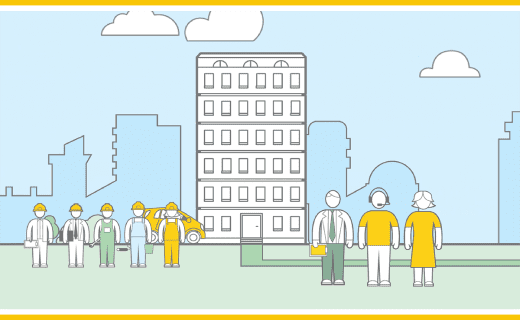Jump to
1. What is the service charge?
Each year, you pay us a service charge. This money goes towards the day-to-day running costs of your development and is used to cover items such as buildings insurance, maintenance, repairs, gardening and communal facilities, as well as for any staff that might work at the development. You can see a specific list of the items that your service charge covers in the annual budget or estimate that we send you. We keep your service charge money in a separate bank account, just for your development, and at the end of the year we send you an account of what we have spent.
2. When is the service charge paid?
This depends on your lease or transfer in England or Wales, or your Deed of Conditions in Scotland.
You may be required to pay your service charge once a year, twice a year (usually every six months) or occasionally in monthly instalments. If you aren’t sure when you should pay your service charge:
- If you live in an independent retirement living development please get in touch with your Development Manager for details.
- If you live or own a property in a general residential development, please get in touch with your Customer Services team.
3. What is the service charge based on?
The Service charge is based on an estimate or budget we prepare each year of all the running costs relating to the communal areas of your development. These could include a number of elements. Some of the most common are:
- Landscape maintenance – such as cutting the grass, maintaining communal gardens, watering and sweeping
- Lighting, heating and cleaning of communal internal areas
- Window cleaning – specific to each development, but would typically include all external windows as well as internal windows in communal areas
- Lift maintenance
- Fire equipment maintenance
- Other electrical and mechanical equipment maintenance – specific to each development, but this could include items such as water pumps, electrically powered entry or security gates, communal heating boilers etc
- General repairs and maintenance
- Salaries of any onsite staff that are employed specifically to work for the development
- Buildings insurance – in the case of apartments, full buildings insurance is required under the terms of the lease to cover the risks relevant to the development. Standard insurance risks might include fire, explosion, lightning, aircraft, terrorism, storm or flood, sprinkler leakage, subsidence or landside etc
- Bank Charges and Audit fees.
4. I own a Freehold house, why am I paying a service charge?
The vast majority of freehold houses in England and Wales are serviced directly by a local council. The council is usually responsible for looking after items such as roads and pavements, street lighting and signage.
But some freehold houses are built on private land, or are part of a larger private development.
This could be for a number of reasons, including:
- There is a mixture of houses and a block (or blocks) of flats on shared grounds.
- It’s behind gates or has a private access roadway.
- The developer and the council have agreed during the planning process that the green spaces and roads are not ‘adopted’ by (the responsibility of) the council, and so need to be managed privately.
In these cases, typically a management company, such as FirstPort, is appointed to look after the communal areas of an estate. An estate service charge is collected by the management company from those people entitled to use the estate’s communal areas. This is to pay for the maintenance or services that are needed.
On estates where FirstPort is the appointed management company, we collect the estate service charge from you once or twice a year, or in rarer cases, it may be quarterly (this depends on your lease or transfer). This is used to pay towards the day-to-day running costs of your Estate and it includes our management fee. For more information on the management fee element of the service charge please see “What does my management fee pay for?”
Residents of freehold houses won’t contribute towards the costs of maintaining any block(s) of flats that might be part of the development. But all residents (whether leaseholders in any flats or owners of freehold houses) living on this type of development will contribute towards the estate service charge.
5. How are the costs worked out?
The service charge is carefully budgeted every year to cover the work there is to do. In the majority of cases, the charges are divided up into equal portions and payable by everyone living on the estate.
All residents pay towards the costs in general, even if the works that are carried out are in another part of the estate to which they live. For instance, you might live in ‘A’ Road but the works are completed in ‘B’ Close. In this case, residents of ‘A’ Road still help contribute towards the works in ‘B’ Close – but equally the opposite will apply.
In our experience, this evens out across a maintenance year so it’s a fair way to split the costs. It also means you never have to worry about finding the right supplier, or deciding how to split the bill with the neighbours – as we do that for you.
The precise way that you contribute towards estate service charges is set out in your ‘Transfer Document’ – the legal paperwork for the purchase of your freehold property. If you’re not sure how it works on your development you can check the service charge accounts we send you at the end of each year.
Was this content useful for you?
Your feedback is important to improving our service. We regularly review these pages and rely on your feedback to ensure you get the information you need.

Manage your account anytime, anywhere with My Home





